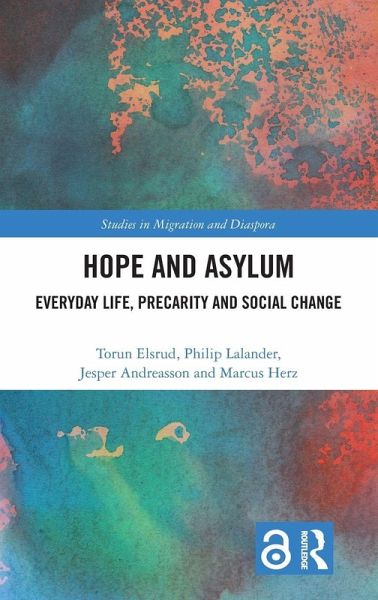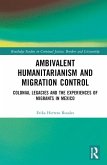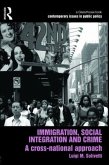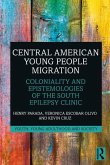Jesper Andreasson, Marcus Herz, Philip Lalander, Torun Elsrud
Hope and Asylum
Everyday Life, Precarity and Social Change
Jesper Andreasson, Marcus Herz, Philip Lalander, Torun Elsrud
Hope and Asylum
Everyday Life, Precarity and Social Change
- Gebundenes Buch
- Merkliste
- Auf die Merkliste
- Bewerten Bewerten
- Teilen
- Produkt teilen
- Produkterinnerung
- Produkterinnerung
This book applies perspectives of hope to understand the precariousness, suffering and agency of people seeking asylum.
Andere Kunden interessierten sich auch für
![Ambivalent Humanitarianism and Migration Control Ambivalent Humanitarianism and Migration Control]() Erika Herrera RosalesAmbivalent Humanitarianism and Migration Control200,99 €
Erika Herrera RosalesAmbivalent Humanitarianism and Migration Control200,99 €![The Development of British Immigration Law The Development of British Immigration Law]() Vaughan BevanThe Development of British Immigration Law174,99 €
Vaughan BevanThe Development of British Immigration Law174,99 €![Immigration, Social Integration and Crime Immigration, Social Integration and Crime]() Luigi M SolivettiImmigration, Social Integration and Crime132,99 €
Luigi M SolivettiImmigration, Social Integration and Crime132,99 €![Rhetoric and Storytelling Within the U.S. Asylum Process Rhetoric and Storytelling Within the U.S. Asylum Process]() Mónica ReyesRhetoric and Storytelling Within the U.S. Asylum Process75,99 €
Mónica ReyesRhetoric and Storytelling Within the U.S. Asylum Process75,99 €![Calais and Its Border Politics Calais and Its Border Politics]() Yasmin IbrahimCalais and Its Border Politics77,99 €
Yasmin IbrahimCalais and Its Border Politics77,99 €![Central American Young People Migration Central American Young People Migration]() Henry ParadaCentral American Young People Migration195,99 €
Henry ParadaCentral American Young People Migration195,99 €![Transnational Public Spheres Transnational Public Spheres]() Mohammadbagher ForoughTransnational Public Spheres198,99 €
Mohammadbagher ForoughTransnational Public Spheres198,99 €-
-
-
This book applies perspectives of hope to understand the precariousness, suffering and agency of people seeking asylum.
Hinweis: Dieser Artikel kann nur an eine deutsche Lieferadresse ausgeliefert werden.
Hinweis: Dieser Artikel kann nur an eine deutsche Lieferadresse ausgeliefert werden.
Produktdetails
- Produktdetails
- Verlag: Taylor & Francis Ltd
- Seitenzahl: 216
- Erscheinungstermin: 14. Mai 2025
- Englisch
- Abmessung: 234mm x 156mm
- ISBN-13: 9781032333045
- ISBN-10: 1032333049
- Artikelnr.: 72737590
- Herstellerkennzeichnung
- Libri GmbH
- Europaallee 1
- 36244 Bad Hersfeld
- gpsr@libri.de
- Verlag: Taylor & Francis Ltd
- Seitenzahl: 216
- Erscheinungstermin: 14. Mai 2025
- Englisch
- Abmessung: 234mm x 156mm
- ISBN-13: 9781032333045
- ISBN-10: 1032333049
- Artikelnr.: 72737590
- Herstellerkennzeichnung
- Libri GmbH
- Europaallee 1
- 36244 Bad Hersfeld
- gpsr@libri.de
Torun Elsrud, PhD and associate professor in sociology, is a senior lecturer in social work at Linnaeus University in Sweden. Employing longitudinal ethnographic methods, her research focuses on critical social work, migration, asylum, informal solidarity networks, bureaucratic violence, racism and gender. Philip Lalander, PhD in sociology, is a professor in social work at Linnaeus University in Sweden. His main research interests concern critical social work, youth culture, longitudinal ethnographic methods, phenomenology/symbolic interactionism, migration, racism, and everyday life. He has also engaged in studies about the use of drugs and criminality. Jesper Andreasson, PhD in sociology, is a professor in sport science at Linnaeus University, Sweden. His research is mainly positioned within gender studies and cultural sociology and focuses on the areas of doping, body and identity, and gender. He has also engaged in studies of fatherhood and family life. Marcus Herz, PhD in Social work, is a professor in social work at the University of Gothenburg. His main research interest is inspired by critical and radical social work and how social work can develop theoretically and practically. Other research interests concern migration, racism, gender, masculinity, and youth culture.
1. The ambiguities of hope in the asylum context; 2. Sweden's post-2015
decline in asylum and human rights: Escalation of deportability in a
European migration context; 3. The fragile character of asylum hope -
Participants' perspectives in an uncertain world of abstract power
structures; 4. Governing through hope in the asylum context; 5. Weakening
of asylum hope through acts of bureaucratic cruelty and racism; 6. Managing
asylum hope to deal with uncertainty and despair;7. Embodied damage -
consequences of living in prolonged insecurity and controlled by border
regimes; 8. Refusing to play the 'asylum game' through radical hope; 9.
Unveiling scars made in Sweden - towards collective hope for social change
decline in asylum and human rights: Escalation of deportability in a
European migration context; 3. The fragile character of asylum hope -
Participants' perspectives in an uncertain world of abstract power
structures; 4. Governing through hope in the asylum context; 5. Weakening
of asylum hope through acts of bureaucratic cruelty and racism; 6. Managing
asylum hope to deal with uncertainty and despair;7. Embodied damage -
consequences of living in prolonged insecurity and controlled by border
regimes; 8. Refusing to play the 'asylum game' through radical hope; 9.
Unveiling scars made in Sweden - towards collective hope for social change
1. The ambiguities of hope in the asylum context; 2. Sweden's post-2015
decline in asylum and human rights: Escalation of deportability in a
European migration context; 3. The fragile character of asylum hope -
Participants' perspectives in an uncertain world of abstract power
structures; 4. Governing through hope in the asylum context; 5. Weakening
of asylum hope through acts of bureaucratic cruelty and racism; 6. Managing
asylum hope to deal with uncertainty and despair;7. Embodied damage -
consequences of living in prolonged insecurity and controlled by border
regimes; 8. Refusing to play the 'asylum game' through radical hope; 9.
Unveiling scars made in Sweden - towards collective hope for social change
decline in asylum and human rights: Escalation of deportability in a
European migration context; 3. The fragile character of asylum hope -
Participants' perspectives in an uncertain world of abstract power
structures; 4. Governing through hope in the asylum context; 5. Weakening
of asylum hope through acts of bureaucratic cruelty and racism; 6. Managing
asylum hope to deal with uncertainty and despair;7. Embodied damage -
consequences of living in prolonged insecurity and controlled by border
regimes; 8. Refusing to play the 'asylum game' through radical hope; 9.
Unveiling scars made in Sweden - towards collective hope for social change








